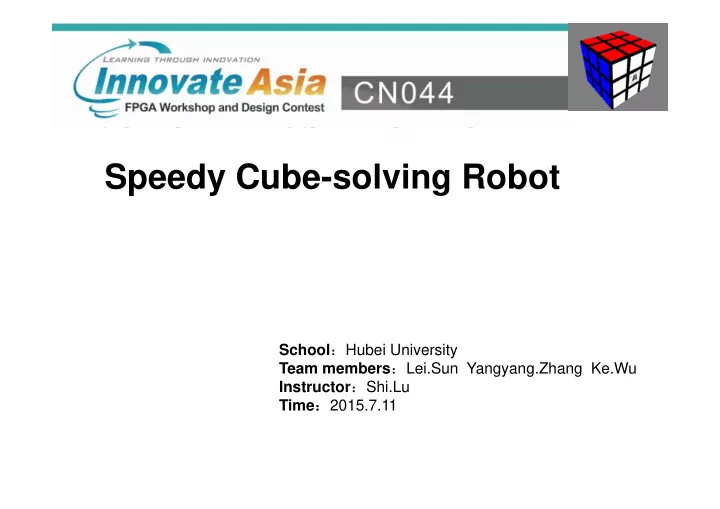

Speedy Cube-solving Robot School : Hubei University Team members : Lei.Sun Yangyang.Zhang Ke.Wu Instructor : Shi.Lu Time : 2015.7.11
NO.1 What we do NO.2 How we do NO.3 What we get
The design is a set of intelligent cube-solving platform which is based on FPGA-HPS data interaction with Linux operating system. overall structure
DE1 ‐ SoC servo LCD screen CCD camera power supply board Components
Function description camera image acqusition Mutifunctonal VGA display Eight-linkage servo for cube reduction Real-time display of digital tube
Composition principle
NO.1 What we do NO.2 How we do NO.3 What we get
1.Color analyzing technology 2.Reduction algorithm for Rubik's cube 3. Eight-linkage servo control 4. FPGA communication with HPS
1.Color analyzing technology Neural network alogrithm features : The use of particle swarm algorithm to traina neural network with three layers can distinguish the cube's six colors in different environment.
1.Color analyzing technology 2.Reduction algorithm for Rubik's cube 3. Eight-linkage servo control 4. FPGA communication with HPS
2.Reduction algorithm for Rubik's cube A* alogrithm: A* (A-Star) is a direct search method for the shortest path in the static network. The closer the assessment value is to the actual value, the better the evaluation function is. alogrithm features : By constantly trying to find the optimization solution to solve the Rubik's cube, steps from more than 100 reduced to about 25 .
1.Color analyzing technology 2.Reduction algorithm for Rubik's cube 3. Eight-linkage servo control 4. FPGA communication with HPS
Crank slider mechanism 3. Eight-linkage servo control structure features: Simple mechanical structure Low cost Good mechanical reliability
1.Color analyzing technology 2.Reduction algorithm for Rubik's cube 3. Eight-linkage servo control 4. FPGA communication with HPS
4. FPGA communication with HPS
The FPGA part ( By ext-bus to read and write mem ) The HPS part ( Use mmap find the device address of the operation ) h2p_lw_extBus_addr =virtual_base + ( ( unsigned long )( ALT_LWFPGASLVS_OFST + EXT_BUS_BASE ) & ( unsigned long)( HW_REGS_MASK ) ); features: Use bus principle, the ext-bus data readable and writable, compared to the direct use PIO, more convenient.
NO.1 What we do NO.2 How we do NO.3 What we get
In the process of the competition, we got much technical support, from Altera company's .We learned a lot from this data, such as, how to realize the bridging between the FPGA and HPS and how to use the hardware to get the camera's data software for data analysis, etc. It's a worth that we have a deep understanding of the idea of the hardware to do the collection and the software to do the algorithm. Through this competition, my team becomes more and more united. Our efforts made us reach this level from the initial unfamiliarity with FPGA , also because of our insistence,we gained many skills. At last, thanks to the support from the Altera and Terasic and useful resources provided by Hubu and Altera EDA/SOPC united laboratory . Thanks to the guidance and company of Teacher Lu.
Thanks
Recommend
More recommend